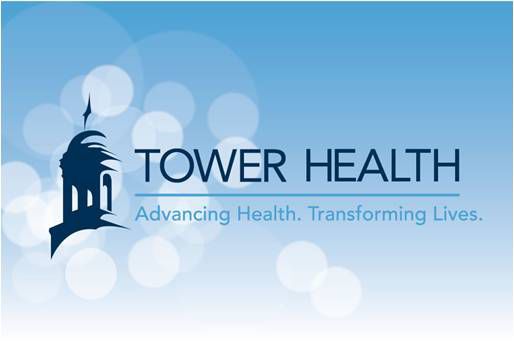Tower Health Shares Community Health Needs Assessment Implementation Plans
Earlier this year, Tower Health completed the 2022 Community Health Needs Assessment (CHNA), which identifies health priorities for its region. CHNA data was collected at the regional level and reported for each service area of Tower Health Hospital. Priority areas for the next three years include: access to equitable care, behavioral health, health education and prevention, and health equity. Equitable care means the provision of care that does not differ in quality based on patient or patient group characteristics such as age, gender, geographic location, cultural background, ethnicity, religion or socioeconomic status.
“At the end of CHNA, each of our hospitals worked with their partners and community organizations to develop their implementation strategy,” said Desha Dickson, Tower Health vice president for diversity, equity, inclusion and community well-being. “The implementation strategy will guide the work we do and the programs we develop over the next three years. I think the most important aspect of the CHNA process is community partnership and engagement. Each of our community partners brings significant and unique expertise. We are much stronger together than we would be individually, and the community benefits from working together.
The implementation plan is a key part of the community health needs assessment process, as it outlines the goals for each priority community need and sets the stage for implementing strategies and initiatives that will impact health outcomes and sustain improved health status in the communities Tower Health serves.
Casey Fenoglio, Community Wellness Program Manager at Pottstown Hospital, said, “Our team is excited to share our plans for the next three years. We will develop new and innovative ideas as well as implement programs that have been successful in other hospitals and organizations.
Several strategies include:
- At Chestnut Hill Hospital, eligible patients with transportation issues will have access to free transportation to and from medical appointments through Ride Health.
- The Phoenixville Hospital team is working to increase access to telemedicine services. Through a collaboration with the Phoenixville Senior Center and other senior residences in the community, the team plans to offer technology education programs. Additionally, they will host events to educate about advancements in healthcare technology, such as remote patient monitoring, which translates into better access to care.
- To help address behavioral health needs in the community, Pottstown Hospital plans to develop a psychiatric street medicine program. The goal is to treat a minimum of 40 patients and connect 30% of patients to routine outpatient therapy. Partners in this initiative include Access Services, Community Health and Dental Care and Creative Health Services.
- Reading Hospital’s Community Connection Program will screen for Medicare, Medicaid and other at-risk populations and deploy community health workers (CHWs) as an intervention to address health disparities in populations in high-risk and vulnerable patients through the creation of closed-loop referrals to community based organizations. Program goals include completing 10,000 patient screenings per year and generating 1,200 referrals.
- Christopher’s Hospital for Children will continue to focus on gun violence prevention to keep children in its community safe. Over the next three years, the team plans to host an annual gun violence prevention forum, distribute gun locks in partnership with Temple University, support buyout program events firearms, conduct “Stop the Bleed” trainings, and conduct firearms and gun safety screening and education. violence at the Center for the Urban Child.
Barbara O’Connor, Director of Community Health Education and Outreach at Phoenixville Hospital added, “We are fortunate to have the support of so many collaborative community partners. By connecting with other local organizations, our hospitals will be able to increase education and access to vital resources and help ensure the health and safety of members of our communities.
“A lot of time and energy is spent completing the community health needs assessment reports and implementation strategy documents,” said P. Sue Perrotty, President and CEO of Tower Health. . “I thank the members of the Tower Health team for their commitment to the health of our communities in Berks, Chester, Montgomery and Philadelphia counties. I also appreciate the continued teamwork of our community partners. By continuing to work together, we will strengthen our communities.
Tower Health CHNA implementation plans are available here:
Questions and comments regarding the Tower Health Community Health Needs Assessment can be sent to [email protected].


Comments are closed.